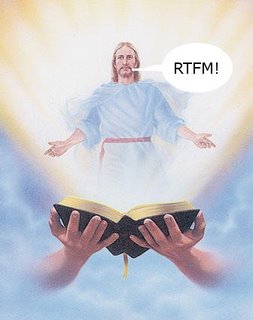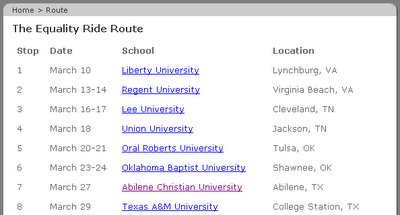 Church Leader Says He Was Lured into Abramoff Web
Church Leader Says He Was Lured into Abramoff Web(Don't miss the response from DeLay's PR guy. It's guaranteed to make you chuckle.)
Christianity. Philosophy. Liberalism.
Investigating the liberality of ... um ... Jesus.
 Church Leader Says He Was Lured into Abramoff Web
Church Leader Says He Was Lured into Abramoff Web
As I understand Romans, Paul uses 1:18 thru 3:20 to establish that all of humanity – both Jew and Gentile – stands sinful and helpless before God. The idea is that humans are simply unable to be righteous on their own, which sets up Paul's proclamation of justification of both Jew and Gentile through faith (3:30).
Roughly speaking, the section consists of three moves.
The first move (which Matt has quoted) describes the thorough sinfulness of Gentiles. The idea is probably to catch the Jews in the audience thinking, "Yeah, those Gentiles really are awful."
But Paul goes on, in his second move (2:1ff), to say that those standing in judgment (perhaps Jews) are sinful as well. Finally, in a third move, (3:9ff) Paul throws out a litany of verses claiming that all of humanity is helplessly sinful.
 Several blogs I frequent have been hosting heated discussions about charity. Seeing as how I'm going to spend entirely too much time writing comments for these discussions, I figured I may as well cross-post to my own blog. This is something I've been meaning to address, anyway.
Several blogs I frequent have been hosting heated discussions about charity. Seeing as how I'm going to spend entirely too much time writing comments for these discussions, I figured I may as well cross-post to my own blog. This is something I've been meaning to address, anyway.

The wrath of God is being revealed from heaven against all the godlessness and wickedness of men who suppress the truth by their wickedness, since what may be known about God is plain to them, because God has made it plain to them. For since the creation of the world God's invisible qualities—his eternal power and divine nature—have been clearly seen, being understood from what has been made, so that men are without excuse.
For although they knew God, they neither glorified him as God nor gave thanks to him, but their thinking became futile and their foolish hearts were darkened.Although they claimed to be wise, they became fools and exchanged the glory of the immortal God for images made to look like mortal man and birds and animals and reptiles.
Therefore God gave them over in the sinful desires of their hearts to sexual impurity for the degrading of their bodies with one another. They exchanged the truth of God for a lie, and worshiped and served created things rather than the Creator—who is forever praised. Amen.
Because of this, God gave them over to shameful lusts. Even their women exchanged natural relations for unnatural ones. In the same way the men also abandoned natural relations with women and were inflamed with lust for one another. Men committed indecent acts with other men, and received in themselves the due penalty for their perversion.
Furthermore, since they did not think it worthwhile to retain the knowledge of God, he gave them over to a depraved mind, to do what ought not to be done. They have become filled with every kind of wickedness, evil, greed and depravity. They are full of envy, murder, strife, deceit and malice. They are gossips, slanderers, God-haters, insolent, arrogant and boastful; they invent ways of doing evil; they disobey their parents; they are senseless, faithless, heartless, ruthless. Although they know God's righteous decree that those who do such things deserve death, they not only continue to do these very things but also approve of those who practice them.
You, therefore, have no excuse, you who pass judgment on someone else, for at whatever point you judge the other, you are condemning yourself, because you who pass judgment do the same things. Now we know that God's judgment against those who do such things is based on truth. So when you, a mere man, pass judgment on them and yet do the same things, do you think you will escape God's judgment?
God gave them over to shameful lusts. Even their women exchanged natural relations for unnatural ones. In the same way the men also abandoned natural relations with women and were inflamed with lust for one another. Men committed indecent acts with other men, and received in themselves the due penalty for their perversion.
The difficultly for the reader in accepting the parable is accepting that both of these facts are true: the money we handle is not our own, and our access to managing it will soon come to an abrupt end.

Study of Heart Patients Sees No Power in Prayer
JEFFERY DUSEK: So in fact the knowledge of receiving prayer seemed to result in a modest level of increase in complications in that group.
ALEX CHADWICK: If you knew you were having this intercessory prayer - strangers you didn't know praying for you - somehow that complicated your recovery in some way.
JEFFERY DUSEK: It did, and essentially within one small complication, which was rapid heartbeat essentially.
 OK, I know you're all excited to get to Romans, but you're just going to have to hold your horses.
OK, I know you're all excited to get to Romans, but you're just going to have to hold your horses. At Connor's suggestion, I'm going to skip ahead to the Vice Lists. But before we do, let me apologize for coming from such a boring direction on the last post. I think that the issue of biblical interpretation is critical to how we continue this discussion, and if we don't agree on some rules about interpreting the text, I'm constantly going to get anonymous commenters accusing me of "bending over backwards to read the meaning I want", or of "ignoring the plain meaning of the scripture." But that last post was kind of a blah way to raise the issue, so maybe we can just deal with it as we go.
At Connor's suggestion, I'm going to skip ahead to the Vice Lists. But before we do, let me apologize for coming from such a boring direction on the last post. I think that the issue of biblical interpretation is critical to how we continue this discussion, and if we don't agree on some rules about interpreting the text, I'm constantly going to get anonymous commenters accusing me of "bending over backwards to read the meaning I want", or of "ignoring the plain meaning of the scripture." But that last post was kind of a blah way to raise the issue, so maybe we can just deal with it as we go.If any of you has a dispute with another, dare he take it before the ungodly for judgment instead of before the saints? Do you not know that the saints will judge the world? And if you are to judge the world, are you not competent to judge trivial cases? Do you not know that we will judge angels? How much more the things of this life! Therefore, if you have disputes about such matters, appoint as judges even men of little account in the church! I say this to shame you. Is it possible that there is nobody among you wise enough to judge a dispute between believers? But instead, one brother goes to law against another — and this in front of unbelievers!
The very fact that you have lawsuits among you means you have been completely defeated already. Why not rather be wronged? Why not rather be cheated? Instead, you yourselves cheat and do wrong, and you do this to your brothers.
Do you not know that the wicked will not inherit the kingdom of God? Do not be deceived: Neither the sexually immoral nor idolaters nor adulterers nor male prostitutes nor homosexual offenders nor thieves nor the greedy nor drunkards nor slanderers nor swindlers will inherit the kingdom of God. And that is what some of you were. But you were washed, you were sanctified, you were justified in the name of the Lord Jesus Christ and by the Spirit of our God.
The word malakoi is not a technical term meaning "homosexuals" (no such term existed either in Greek or in Hebrew),but it appears often in Hellenistic Greek as pejorative slang to describe the "passive" partners -- often young boys -- in homosexual activity.
Richard B. Hays, "Awaiting the Redemption of Our bodies: The Witness of Scripture Concerning Homosexuality", in John Carey, ed, The Homosexuality Debate in North American Churches.
 OK, Scott and Connor say that no one is going to argue with the previous post, so I'm going to chalk that one up as a perfect interpretation of Genesis 19. Let's say it together one more time,
OK, Scott and Connor say that no one is going to argue with the previous post, so I'm going to chalk that one up as a perfect interpretation of Genesis 19. Let's say it together one more time, OK, Connor, we'll eventually get to the Vice Lists, but in deference to our anonymous commenter, let's start with the account of Sodom and Gomorrah in Genesis 19.
OK, Connor, we'll eventually get to the Vice Lists, but in deference to our anonymous commenter, let's start with the account of Sodom and Gomorrah in Genesis 19. The two angels arrived at Sodom in the evening, and Lot was sitting in the gateway of the city. When he saw them, he got up to meet them and bowed down with his face to the ground. "My lords," he said, "please turn aside to your servant's house. You can wash your feet and spend the night and then go on your way early in the morning."
"No," they answered, "we will spend the night in the square."
But he insisted so strongly that they did go with him and entered his house. He prepared a meal for them, baking bread without yeast, and they ate.
Lot went outside to meet them and shut the door behind him and said, "No, my friends. Don't do this wicked thing. Look, I have two daughters who have never slept with a man. Let me bring them out to you, and you can do what you like with them. But don't do anything to these men, for they have come under the protection of my roof."
"Get out of our way!" they replied. "We are overcome with homoxsexual lust, like vampires who need to feed! We know that it is wicked, but we must have homosexual sex!"
"Get out of our way," they replied. And they said, "This fellow came here as an alien, and now he wants to play the judge! We'll treat you worse than them." They kept bringing pressure on Lot and moved forward to break down the door.
This is not a story about homosexual behavior in general -- and certainly not a story about homosexual acts performed by consenting adults. It is a story about the intent to do violence to strangers, who ought rather to have been accorded protection. It is only incidental to the story that, had the attack succeeded, it would have meant the rape of Lot's two male visitors by a mob of other males.
Victor Paul Furnish, "The Bible and Homosexuality: Reading the Texts in Context", in John Carey, ed, The Homosexuality Debate in North American Churches..
Now this was the sin of your sister Sodom: She and her daughters were arrogant, overfed and unconcerned; they did not help the poor and needy. They were haughty and did detestable things before me. Therefore I did away with them as you have seen.
 In the Hebrew Scriptures, "the stranger and alien among you" are often lumped into a category with the poor and needy. So when Ezekiel makes reference to the poor and needy, we may infer that he interprets the Sodom story as a story about the men of Sodom abusing this category of people. And across the entire Bible, protecting the stranger is a much bigger theme than the wickedness of homoerotic behavior. The hebrew prophets are constantly saying things like, "God wants you to love those who are outsiders, and protect those who are defenseless."
In the Hebrew Scriptures, "the stranger and alien among you" are often lumped into a category with the poor and needy. So when Ezekiel makes reference to the poor and needy, we may infer that he interprets the Sodom story as a story about the men of Sodom abusing this category of people. And across the entire Bible, protecting the stranger is a much bigger theme than the wickedness of homoerotic behavior. The hebrew prophets are constantly saying things like, "God wants you to love those who are outsiders, and protect those who are defenseless." Anonymous Said: Homosexuality is directly related to the destruction of Sodom and Gomorrah. It is described in Romans 1 with words like “indecent” and “perversion”. It is mentioned in 1st Corinthians in a list along with “sexually immoral, adulterers, thieves, slanderers and swindlers” and followed by paragraphs about sexual immorality. In Leviticus, it is called “detestable”. If we were to read any of those sections without a previous opinion on the issue, it’s not likely we would come to the conclusion that the Bible is either indifferent or approving of homosexuality.
As I've led discussions about the ministry of women, I've often heard people say, "We shouldn't make the Bible say what we want it to say." I agree. Absolutely. But let's also be honest about this: none of us comes to scripture completely objective and unbiased. All of us are having to use tools of interpretation.
Was the church's embrace of people who were once divorced and are now living faithfully in second marriages a precedent for embracing homosexual people who live faithfully in covenanted partnerships?
The first question is this: Is a partnership of two homosexual persons morally similar - in relevant ways - to the marriage of divorced and remarried heterosexual people?
The second question we must answer is this: Does the Bible's word about homosexuals lay down a rule for excluding partnered Christian homosexuals from the church's fellowship? Or does it witness to God's original intention for sexual orientation without laying down abiding rules for the church?
After reading this post, I have to wonder if the author was actually in chapel on the day that Dr. Money spoke. There were equal amounts of clapping/cheering, if not more, when Dr. Money stated they would be welcoming SoulForce...
For those of you who feel that this is cool, that you're sad it didn't happen while you were at ACU, and for those who would like to be at ACU to see this...you have no idea what difficult decision this has been for the ACU administration and ACU community. The administration is completely aware of the "underground homosexuality" on campus and is completely aware that ACU had an SA president that is now "out." The bubble is not that thick. Instead of guessing at the facts surrounding these decisions, instead of wishing you were here during this trying time, instead of stating how you would handle these things differently, instead of saying you're dissappointed in the student body...I would encourage you to pray. Pray for those who are making the decisions about SoulForce. Pray for the "riders." Pray for the ACU administration and for the students, faculty, and staff on campus while this is going on. This is not easy, nor is it a show for the ammusement of bloggers.
I'm sure that you're being completely sincere here, but I have to confess to a little skepticism because you don't give us any explanation. What makes this this such a "difficult decision" and a "trying time"?
I mean, after reading their Web site, and talking to an equality ride coordinator, it seems pretty clear that the riders won't be megaphone-toting belligerents. So it seems to me that in the interest of open discussion, administrators should simply welcome the riders and let them wander the campus. Then people can make their own decisions about whether ACU is upholding Christian values.
But maybe there's something I'm missing?

MONEY: Now we could tell these people that they're not welcome on our campus, and when they show up, we could call the police and have them arrested.
[The audience cheers and applauds.]
MONEY: Um ... but ... that's not what we want to do.
[Silence. Then a few people clap. One voice yells, "Thank you!"]
2. Section Two violations. These violations will result in a minimum disciplinary response of probation on the first occurrence or suspension/dismissal on the second occurrence, with additional conditions or alternative requirements. They include, but are not limited to, the following: ... 2-14. Cohabitation and/or sexual immorality, including homosexual behavior.